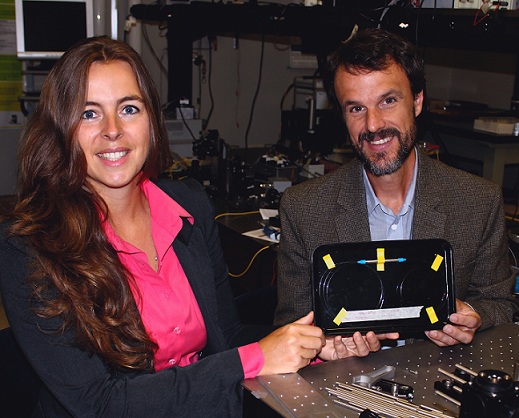Nouvelles
Caroline Boudoux and Nicolas Godbout launch Castor Optique, a new spinoff from Polytechnique Montréal
“Starting a business was not part of our career plan,” says Boudoux. “We wanted to partner with a company
that would produce the coupler and manage technology transfer, but we couldn't find one that could handle all aspects of the
project. Commercializing the coupler ourselves appeared to be the best way to make the technology available to the entire
market.”

Castor Optique commercializes the fibre-optic coupler that Boudoux and Godbout designed. The coupler has numerous applications in optical imaging, especially in the biomedical field. Equipped with a Castor Optique coupler, imaging devices—including those used in endoscopy and optical coherence tomography (OCT)—generate better quality images and can improve the diagnosis of several diseases.
“This technology has proven itself in ophthalmology and is beginning to be used in cardiology,” explains
Boudoux. “Combined with fluorescence imaging or Raman spectroscopy, the coupler permits significant advances in
diagnosing diseases of the retina, classifying atherosclerotic plaques and detecting lung tumours. It can also be useful in
heavy industries, such as the oil industry, where imaging devices are used in hostile environments.”
“In fact, we do not fear that the market is too small, but rather that it's too big,” says Godbout.
The challenges of entrepreneurship
Moving from research to entrepreneurship presents challenges that
the two professors and researchers acknowledge and are willing to face.
“There are many aspects to starting a business and we need to make many decisions,” says Boudoux.
“Fortunately, we are very well supported. Univalor put us in contact with professionals, businesspeople and organizations
that give us not only business advice but also life advice. To learn, we just need to listen.”
For Godbout, entrepreneurship is demanding but not so different from research. “In both cases, you need versatility and
creativity,” he says. “Being responsible for a research team is a bit like being a business owner: you need to find
financing, sell the project to potential partners, establish a network of contacts, hire people and manage finances.”
“Good researchers, like the best entrepreneurs, are able to question themselves and surround themselves with good
people,” says Boudoux. “Nicolas and I are confident we can manage Castor Optique in its initial phase, but we are
aware that the growth phase will require us to delegate certain tasks to more experienced managers.”
Spin-offs create value
Since its launch in 2001, Univalor has helped create 40 spin-offs. However, nurturing
spin-offs in a university environment is like figuring out an equation with many variables. “Basically,” says
Thomas Martinuzzo, Univalor's Manager of Business Development and Startups, “we need four elements to create a spin-off:
a technology that responds to a market opportunity, researchers who want to share their invention for society's benefit,
resources and funding.”
In the case of Castor Optique, all these ingredients were there. “The goal is to help researchers achieve their business
vision,” says Martinuzzo. “We helped Caroline and Nicolas create the legal structure of the company, we put them in
contact with businesspeople and potential investors, we invested in the business, and we are dedicating one day a week to
assist them develop their business plan. In short, we are helping them take their first steps as entrepreneurs and manage the
company's start-up. When the company gains momentum, we will help them establish a team to support them in the growth
phase.”
A business model in flux
Castor Optique may grow rapidly. The company, which has already received
orders, plans to make its first sales in the coming months.
“There is already interest from companies that commercialize components for the biomedical industry or sell optical
imaging systems, such as OCT,” explains Godbout. “For the moment, we can produce enough couplers ourselves to meet
the demand, but when we enter the growth stage, we will have to consider alternatives. Ultimately, we could have a different
business model: Castor Optique could design couplers adapted to each market, and then grant the rights to manufacture and
distribute them to other companies in the sector. Castor Optique could also help these companies develop other specialized
couplers.”
“Ultimately, we want our products to be integrated with available clinical or industrial imaging systems, and to directly
benefit people and businesses,” says Boudoux. “We have the opportunity to choose the direction that suits us best
to get there, and we are taking full advantage of this start-up phase to surround ourselves with good people and refine our
business model.”
Professor Boudoux's expertise.
Professor Godbout's expertise.
Source : Univalor



